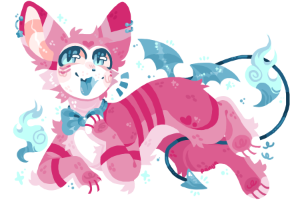username;;
iBrevity
name;;
Orpheus
gender;;
male
personality;;
Orpheus is shy and rather quiet and wondrously optimistic. He's the sort to always have a smile on his face, no matter the situation or weather. He's an excellent friend because he is genuinely invested in everybody he meets, and he's so amiable that no one is a stranger to him for long. He laughs often and at great length, and believes in sharing joy with others so he's constantly delivering flowers around the castle he calls home. He has a soft spot for nature and believes nothing is more beautiful than watching something lovely grow.
[96/100]
his pet;;
When Orpheus was sixteen his grandmother unexpectedly passed away. He was called to attend a will reading, and it was there that he found out he'd been named the inheritor of her scarlet macaw, Lyra. Lyra was all of six years old and expected to live a great deal longer; and so Orpheus, as he had loved his grandmother very dearly, took Lyra home with him. He practically grew up with her, went through college with her to pick apart his homework with her enormous, nimble beak, moved from America to Europe with her in the seat next to him. She became a constant staple in his life when everything else changed and shifted, and he came to appreciate that about her. Lyra and him have a very close relationship, and she's practically always with him, either walking along beside him or sitting on an arm or shoulder. Lyra never learned to fly and is now too old to, but Orpheus loves her despite it. When he goes into the garden she meanders about eating insects and calling to the wild birds, but she always returns to him when it's time to go inside.
[194/200]
his home;;
Orpheus' grandmother always told him that he would know he'd found his home by the smell of it. As a child he'd been bewildered by the advice, but he'd loved his grandmother and so he had mutely accepted what she'd told him. He had never felt at ease in New York City, where he'd been born and raised, and the stench of the big city was not something he had ever learned to ignore. He was restless there, eager to get through school and move, but when he picked out Rossore to visit as a college graduation present from his parents he'd initially thought of it as nothing more than a vacation.
The first time he'd seen the garden, nestled in against the ancient cracked wall of Rossore's established capital castle, he'd fallen in love. It had smelled so soft and sweet, the flowers heady with nectar, the air warmed by the passing of bees and butterflies. He had felt a tug in the very core of his heart that he had never felt before, and when he went home he immediately began to pack. The paperwork to get Lyra into the country was exhausting but necessary and, faster than he could have ever imagined, they were on board the flight that would take them across the ocean to his home. He thought of it with such warmth that the natural apprehension of moving somewhere completely foreign vanished. He knew he was not making a mistake, felt the surety to the marrow of his bones. This was where he was supposed to go.
Now, some three years later, Orpheus wakes every day with a sleepy, happy smile. He keeps his windows open overnight to let in the scent of the flowers and his room is filled with it, the smell clinging to his pillows and sheets, the perfume rousing Lyra in her cage perched near his bed with a soft chirp. He no longer wonders what his grandmother meant, when he walks through the garden with happiness swelling beneath his ribs; he feels home like it's a living, breathing thing, feels it when he touches Lyra's feathers, feels it with his hands buried to the wrist in the damp soil. He feels it in his close friendship with the king, a man who insists Orpheus call him "Zevi", a man who kneels beside him to inspect the new flowers with a soft smile. Orpheus has never had a best friend, but it feels natural here. This is his home, after all; he is meant to be happy.
When winter comes he goes outside to cover his garden and tuck in the flowers who are reluctant to sleep. Winter smells different here too, cleaner somehow, sharper; those flowers who thrive even in the cold lend the air something almost magical. He eats berries native to Rossore who grow nestled in a cradle of snow, and their taste brings to him the promise of spring. He does not mind the cold weather for this alone.
In the winter he keeps his windows shut and hangs dried flowers from his walls so he can remember the smell. In the winter he runs a heater in his little room, a narrow, newer addition to the castle that juts off some fifteen feet into the garden, and preens over the plants he has crowded into the windowsill. In the winter he spends far more time in the body of the castle itself keeping Zevi company, telling him stories from his childhood in America, talking about the plants he is considering purchasing for the oncoming spring. Zevi gives him a budget larger than he has given any gardener before, but he doesn't tell this to Orpheus. Rather Orpheus hears it from the merchants, the visitors, in their awed comments and whispers. Orpheus feels pride in this as well; he is as entrenched in his home as it is in him.
When spring arrives Orpheus all but forgoes his room. He spends his days outside, Lyra at his heels or at his shoulder, tools tucked into his belt. He walks the entirety of the castle's perimeter to check on the plants he'd purchased that winter, to shape the trees who reach for yard sticks and fences, to greet the visitors who stop by and ogle at his work. Orpheus tells them shyly who he is when they ask, but he's eager to return to the garden when the conversation dwindles. It is here Orpheus belongs, not to the realm of people. He will always be more comfortable among the flowers than he will in a crowd.
But spring lends the seeds warmth and the flowers find solace in his singing and the bushes grow larger and the trees taller. Summer creeps in and Orpheus works harder to keep his plants watered, creates phenomenal tangles of hoses and buckets that only he can navigate. When he goes to bed still smelling faintly of dirt he can detect the perfume of flowers in his room as well, the dried ones on the wall, the fragrance drifting in from the garden outside. He falls asleep smiling, happy, satisfied that he has found the home his grandmother always promised him. Orpheus has learned that home is not where you are born, but where you settle, and Rossore is more his home than New York ever could have been.
[897/900]
an interesting fact;;
Orpheus believes that singing to plants is a guaranteed way to make them grow up happy and strong. As he is employed as the gardener and estate manager for Rossore's capital castle he has many chances to sing to his garden, and does it frequently in the privacy lent to him by the night. Most nights he can reliably be found wandering the rows of his plants singing softly under his breath, but only when the moon is highest in the sky and the castle is quiet in its slumber. Lyra sleeps during this time too, one of the few occurrences where they are apart, but he likes the solitude of it, the inherent loneliness. It feels like when he sings the plants take things from him, hope or something very much like it, and it makes them stronger and brighter when they finally bloom. He does not tell anyone that he sings to plants, as often they think him weird for it, but Orpheus does it all the same. He has been praised since childhood for his sweet, soft voice, although these days it is only the plants who get to hear it.
[194/200]
extra;;

[art by elyhria]
iBrevity
name;;
Orpheus
gender;;
male
personality;;
Orpheus is shy and rather quiet and wondrously optimistic. He's the sort to always have a smile on his face, no matter the situation or weather. He's an excellent friend because he is genuinely invested in everybody he meets, and he's so amiable that no one is a stranger to him for long. He laughs often and at great length, and believes in sharing joy with others so he's constantly delivering flowers around the castle he calls home. He has a soft spot for nature and believes nothing is more beautiful than watching something lovely grow.
[96/100]
his pet;;
When Orpheus was sixteen his grandmother unexpectedly passed away. He was called to attend a will reading, and it was there that he found out he'd been named the inheritor of her scarlet macaw, Lyra. Lyra was all of six years old and expected to live a great deal longer; and so Orpheus, as he had loved his grandmother very dearly, took Lyra home with him. He practically grew up with her, went through college with her to pick apart his homework with her enormous, nimble beak, moved from America to Europe with her in the seat next to him. She became a constant staple in his life when everything else changed and shifted, and he came to appreciate that about her. Lyra and him have a very close relationship, and she's practically always with him, either walking along beside him or sitting on an arm or shoulder. Lyra never learned to fly and is now too old to, but Orpheus loves her despite it. When he goes into the garden she meanders about eating insects and calling to the wild birds, but she always returns to him when it's time to go inside.
[194/200]
his home;;
Orpheus' grandmother always told him that he would know he'd found his home by the smell of it. As a child he'd been bewildered by the advice, but he'd loved his grandmother and so he had mutely accepted what she'd told him. He had never felt at ease in New York City, where he'd been born and raised, and the stench of the big city was not something he had ever learned to ignore. He was restless there, eager to get through school and move, but when he picked out Rossore to visit as a college graduation present from his parents he'd initially thought of it as nothing more than a vacation.
The first time he'd seen the garden, nestled in against the ancient cracked wall of Rossore's established capital castle, he'd fallen in love. It had smelled so soft and sweet, the flowers heady with nectar, the air warmed by the passing of bees and butterflies. He had felt a tug in the very core of his heart that he had never felt before, and when he went home he immediately began to pack. The paperwork to get Lyra into the country was exhausting but necessary and, faster than he could have ever imagined, they were on board the flight that would take them across the ocean to his home. He thought of it with such warmth that the natural apprehension of moving somewhere completely foreign vanished. He knew he was not making a mistake, felt the surety to the marrow of his bones. This was where he was supposed to go.
Now, some three years later, Orpheus wakes every day with a sleepy, happy smile. He keeps his windows open overnight to let in the scent of the flowers and his room is filled with it, the smell clinging to his pillows and sheets, the perfume rousing Lyra in her cage perched near his bed with a soft chirp. He no longer wonders what his grandmother meant, when he walks through the garden with happiness swelling beneath his ribs; he feels home like it's a living, breathing thing, feels it when he touches Lyra's feathers, feels it with his hands buried to the wrist in the damp soil. He feels it in his close friendship with the king, a man who insists Orpheus call him "Zevi", a man who kneels beside him to inspect the new flowers with a soft smile. Orpheus has never had a best friend, but it feels natural here. This is his home, after all; he is meant to be happy.
When winter comes he goes outside to cover his garden and tuck in the flowers who are reluctant to sleep. Winter smells different here too, cleaner somehow, sharper; those flowers who thrive even in the cold lend the air something almost magical. He eats berries native to Rossore who grow nestled in a cradle of snow, and their taste brings to him the promise of spring. He does not mind the cold weather for this alone.
In the winter he keeps his windows shut and hangs dried flowers from his walls so he can remember the smell. In the winter he runs a heater in his little room, a narrow, newer addition to the castle that juts off some fifteen feet into the garden, and preens over the plants he has crowded into the windowsill. In the winter he spends far more time in the body of the castle itself keeping Zevi company, telling him stories from his childhood in America, talking about the plants he is considering purchasing for the oncoming spring. Zevi gives him a budget larger than he has given any gardener before, but he doesn't tell this to Orpheus. Rather Orpheus hears it from the merchants, the visitors, in their awed comments and whispers. Orpheus feels pride in this as well; he is as entrenched in his home as it is in him.
When spring arrives Orpheus all but forgoes his room. He spends his days outside, Lyra at his heels or at his shoulder, tools tucked into his belt. He walks the entirety of the castle's perimeter to check on the plants he'd purchased that winter, to shape the trees who reach for yard sticks and fences, to greet the visitors who stop by and ogle at his work. Orpheus tells them shyly who he is when they ask, but he's eager to return to the garden when the conversation dwindles. It is here Orpheus belongs, not to the realm of people. He will always be more comfortable among the flowers than he will in a crowd.
But spring lends the seeds warmth and the flowers find solace in his singing and the bushes grow larger and the trees taller. Summer creeps in and Orpheus works harder to keep his plants watered, creates phenomenal tangles of hoses and buckets that only he can navigate. When he goes to bed still smelling faintly of dirt he can detect the perfume of flowers in his room as well, the dried ones on the wall, the fragrance drifting in from the garden outside. He falls asleep smiling, happy, satisfied that he has found the home his grandmother always promised him. Orpheus has learned that home is not where you are born, but where you settle, and Rossore is more his home than New York ever could have been.
[897/900]
an interesting fact;;
Orpheus believes that singing to plants is a guaranteed way to make them grow up happy and strong. As he is employed as the gardener and estate manager for Rossore's capital castle he has many chances to sing to his garden, and does it frequently in the privacy lent to him by the night. Most nights he can reliably be found wandering the rows of his plants singing softly under his breath, but only when the moon is highest in the sky and the castle is quiet in its slumber. Lyra sleeps during this time too, one of the few occurrences where they are apart, but he likes the solitude of it, the inherent loneliness. It feels like when he sings the plants take things from him, hope or something very much like it, and it makes them stronger and brighter when they finally bloom. He does not tell anyone that he sings to plants, as often they think him weird for it, but Orpheus does it all the same. He has been praised since childhood for his sweet, soft voice, although these days it is only the plants who get to hear it.
[194/200]
extra;;

[art by elyhria]






.png)
.jpg)


.jpg)



















